Mandatory Sentencing: A Critical Analysis of Three Strike Rules in Law
VerifiedAdded on 2020/05/08
|7
|1509
|41
Essay
AI Summary
This law assignment examines the 'Three Strike' rules, focusing on their implementation in Australia, particularly concerning home burglary laws in Western Australia. The assignment explores the concept of mandatory sentencing, its origins in parliamentary intervention, and the public misconceptions surrounding crime and justice. It delves into the specifics of the Criminal Code, outlining penalties for offenses related to home burglary. A significant portion of the assignment analyzes the disadvantages of the 'Three Strike' rule, highlighting issues of racial and ethnic discrimination, and the potential violation of equality principles. The essay references studies and reports, including those from Amnesty International and the Los Angeles Times, to demonstrate the disproportionate impact of these rules on minority groups, leading to higher imprisonment rates. The assignment concludes by emphasizing the need to consider the effects of these laws and their potential to undermine fundamental legal principles, along with a list of references.

Running Head: Law 1
Law
Law
Paraphrase This Document
Need a fresh take? Get an instant paraphrase of this document with our AI Paraphraser
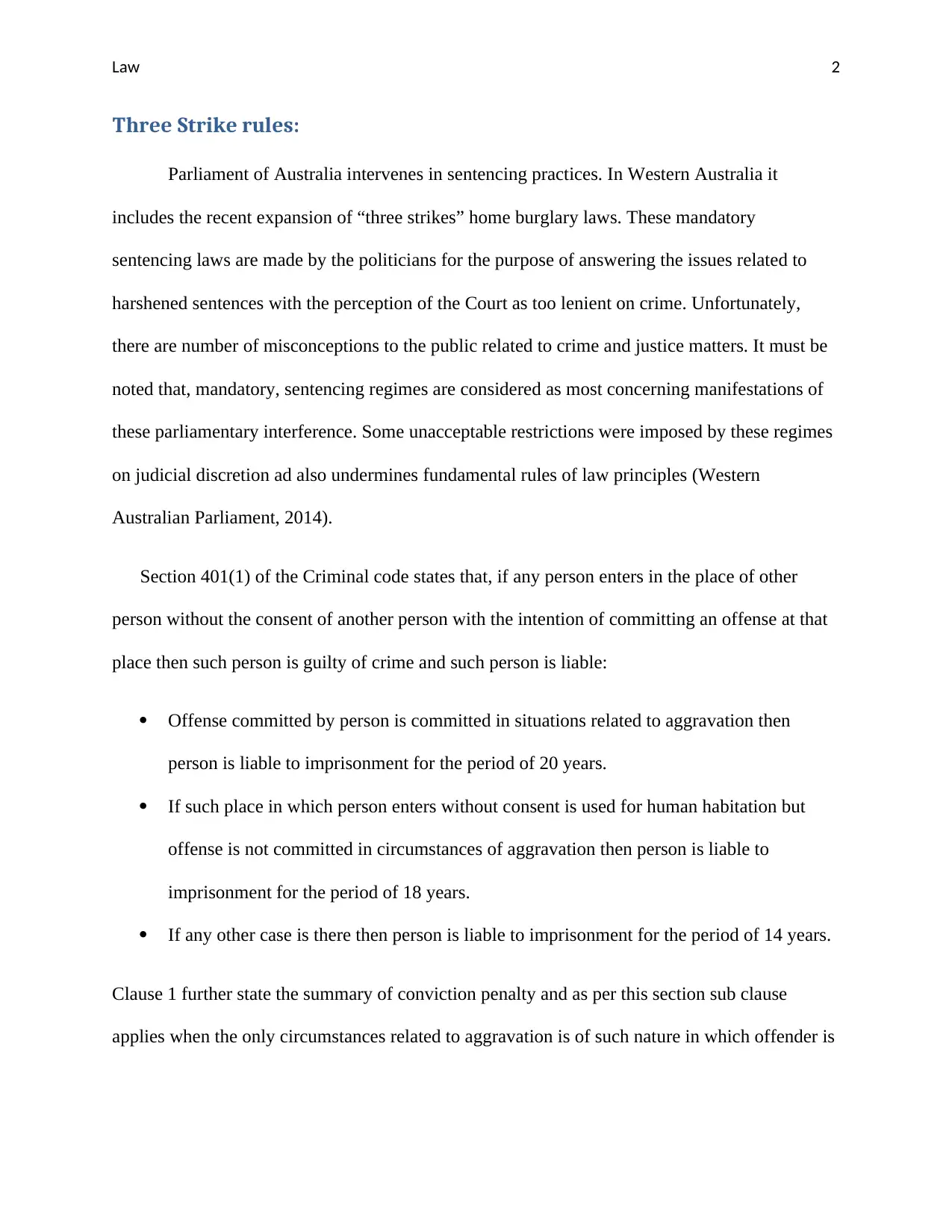
Law 2
Three Strike rules:
Parliament of Australia intervenes in sentencing practices. In Western Australia it
includes the recent expansion of “three strikes” home burglary laws. These mandatory
sentencing laws are made by the politicians for the purpose of answering the issues related to
harshened sentences with the perception of the Court as too lenient on crime. Unfortunately,
there are number of misconceptions to the public related to crime and justice matters. It must be
noted that, mandatory, sentencing regimes are considered as most concerning manifestations of
these parliamentary interference. Some unacceptable restrictions were imposed by these regimes
on judicial discretion ad also undermines fundamental rules of law principles (Western
Australian Parliament, 2014).
Section 401(1) of the Criminal code states that, if any person enters in the place of other
person without the consent of another person with the intention of committing an offense at that
place then such person is guilty of crime and such person is liable:
Offense committed by person is committed in situations related to aggravation then
person is liable to imprisonment for the period of 20 years.
If such place in which person enters without consent is used for human habitation but
offense is not committed in circumstances of aggravation then person is liable to
imprisonment for the period of 18 years.
If any other case is there then person is liable to imprisonment for the period of 14 years.
Clause 1 further state the summary of conviction penalty and as per this section sub clause
applies when the only circumstances related to aggravation is of such nature in which offender is
Three Strike rules:
Parliament of Australia intervenes in sentencing practices. In Western Australia it
includes the recent expansion of “three strikes” home burglary laws. These mandatory
sentencing laws are made by the politicians for the purpose of answering the issues related to
harshened sentences with the perception of the Court as too lenient on crime. Unfortunately,
there are number of misconceptions to the public related to crime and justice matters. It must be
noted that, mandatory, sentencing regimes are considered as most concerning manifestations of
these parliamentary interference. Some unacceptable restrictions were imposed by these regimes
on judicial discretion ad also undermines fundamental rules of law principles (Western
Australian Parliament, 2014).
Section 401(1) of the Criminal code states that, if any person enters in the place of other
person without the consent of another person with the intention of committing an offense at that
place then such person is guilty of crime and such person is liable:
Offense committed by person is committed in situations related to aggravation then
person is liable to imprisonment for the period of 20 years.
If such place in which person enters without consent is used for human habitation but
offense is not committed in circumstances of aggravation then person is liable to
imprisonment for the period of 18 years.
If any other case is there then person is liable to imprisonment for the period of 14 years.
Clause 1 further state the summary of conviction penalty and as per this section sub clause
applies when the only circumstances related to aggravation is of such nature in which offender is
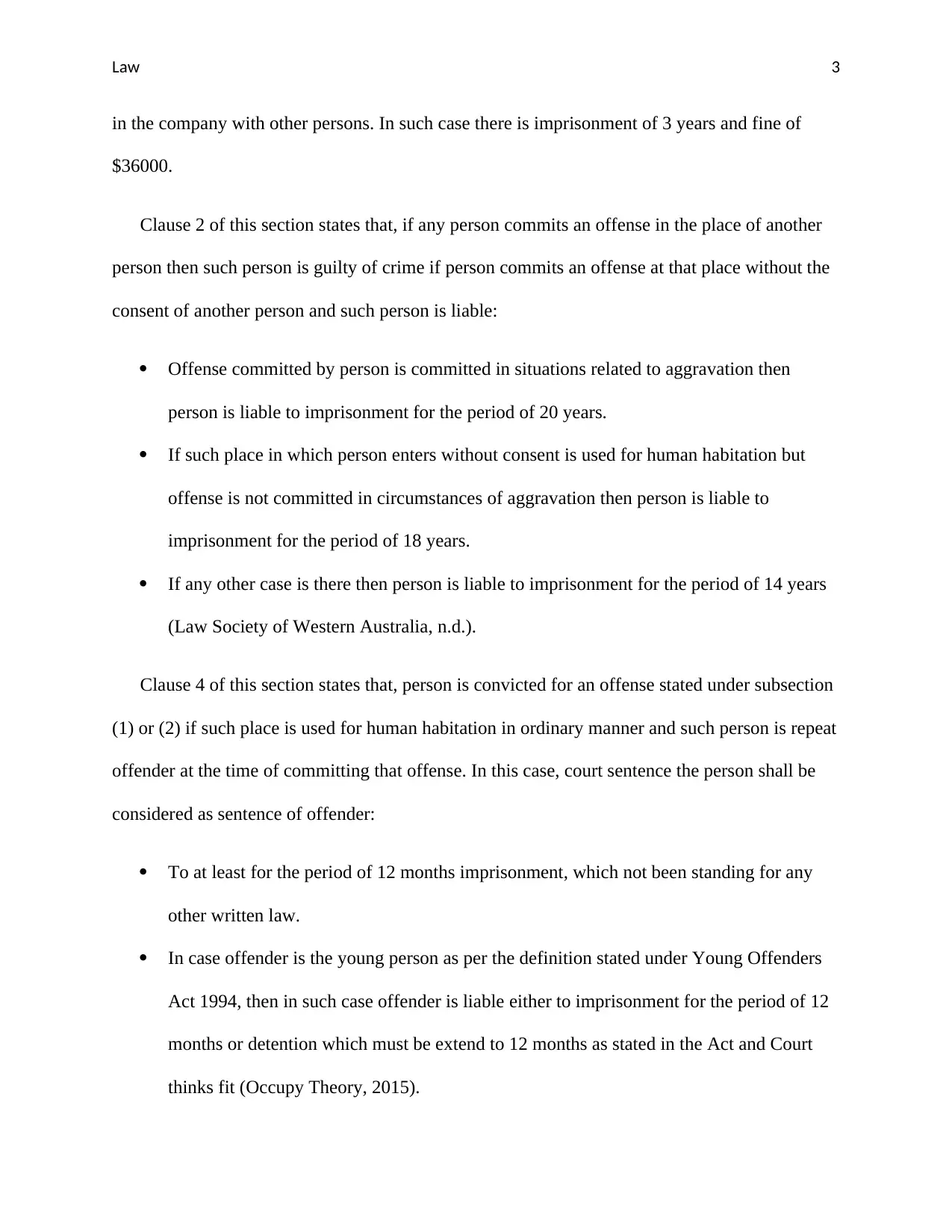
Law 3
in the company with other persons. In such case there is imprisonment of 3 years and fine of
$36000.
Clause 2 of this section states that, if any person commits an offense in the place of another
person then such person is guilty of crime if person commits an offense at that place without the
consent of another person and such person is liable:
Offense committed by person is committed in situations related to aggravation then
person is liable to imprisonment for the period of 20 years.
If such place in which person enters without consent is used for human habitation but
offense is not committed in circumstances of aggravation then person is liable to
imprisonment for the period of 18 years.
If any other case is there then person is liable to imprisonment for the period of 14 years
(Law Society of Western Australia, n.d.).
Clause 4 of this section states that, person is convicted for an offense stated under subsection
(1) or (2) if such place is used for human habitation in ordinary manner and such person is repeat
offender at the time of committing that offense. In this case, court sentence the person shall be
considered as sentence of offender:
To at least for the period of 12 months imprisonment, which not been standing for any
other written law.
In case offender is the young person as per the definition stated under Young Offenders
Act 1994, then in such case offender is liable either to imprisonment for the period of 12
months or detention which must be extend to 12 months as stated in the Act and Court
thinks fit (Occupy Theory, 2015).
in the company with other persons. In such case there is imprisonment of 3 years and fine of
$36000.
Clause 2 of this section states that, if any person commits an offense in the place of another
person then such person is guilty of crime if person commits an offense at that place without the
consent of another person and such person is liable:
Offense committed by person is committed in situations related to aggravation then
person is liable to imprisonment for the period of 20 years.
If such place in which person enters without consent is used for human habitation but
offense is not committed in circumstances of aggravation then person is liable to
imprisonment for the period of 18 years.
If any other case is there then person is liable to imprisonment for the period of 14 years
(Law Society of Western Australia, n.d.).
Clause 4 of this section states that, person is convicted for an offense stated under subsection
(1) or (2) if such place is used for human habitation in ordinary manner and such person is repeat
offender at the time of committing that offense. In this case, court sentence the person shall be
considered as sentence of offender:
To at least for the period of 12 months imprisonment, which not been standing for any
other written law.
In case offender is the young person as per the definition stated under Young Offenders
Act 1994, then in such case offender is liable either to imprisonment for the period of 12
months or detention which must be extend to 12 months as stated in the Act and Court
thinks fit (Occupy Theory, 2015).
⊘ This is a preview!⊘
Do you want full access?
Subscribe today to unlock all pages.

Trusted by 1+ million students worldwide
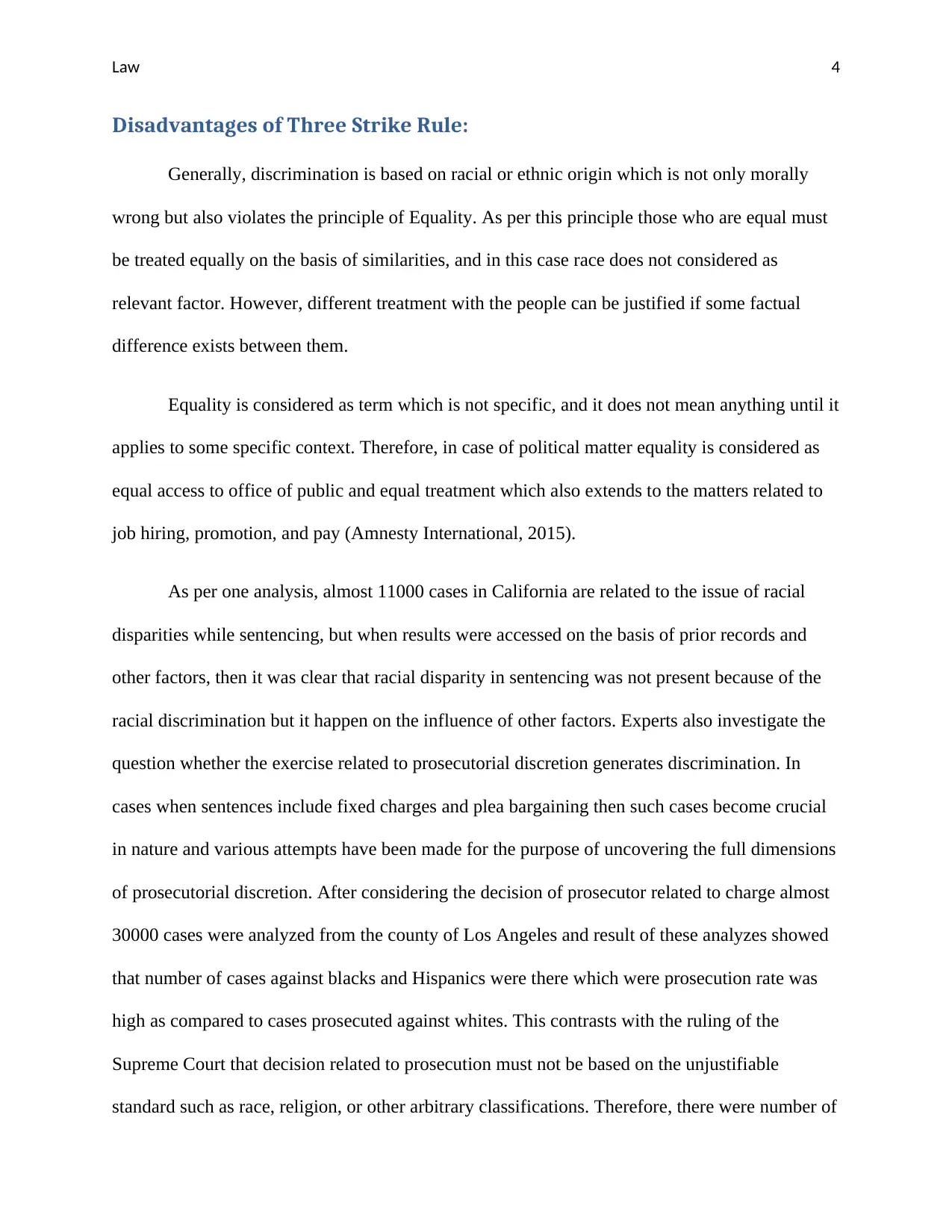
Law 4
Disadvantages of Three Strike Rule:
Generally, discrimination is based on racial or ethnic origin which is not only morally
wrong but also violates the principle of Equality. As per this principle those who are equal must
be treated equally on the basis of similarities, and in this case race does not considered as
relevant factor. However, different treatment with the people can be justified if some factual
difference exists between them.
Equality is considered as term which is not specific, and it does not mean anything until it
applies to some specific context. Therefore, in case of political matter equality is considered as
equal access to office of public and equal treatment which also extends to the matters related to
job hiring, promotion, and pay (Amnesty International, 2015).
As per one analysis, almost 11000 cases in California are related to the issue of racial
disparities while sentencing, but when results were accessed on the basis of prior records and
other factors, then it was clear that racial disparity in sentencing was not present because of the
racial discrimination but it happen on the influence of other factors. Experts also investigate the
question whether the exercise related to prosecutorial discretion generates discrimination. In
cases when sentences include fixed charges and plea bargaining then such cases become crucial
in nature and various attempts have been made for the purpose of uncovering the full dimensions
of prosecutorial discretion. After considering the decision of prosecutor related to charge almost
30000 cases were analyzed from the county of Los Angeles and result of these analyzes showed
that number of cases against blacks and Hispanics were there which were prosecution rate was
high as compared to cases prosecuted against whites. This contrasts with the ruling of the
Supreme Court that decision related to prosecution must not be based on the unjustifiable
standard such as race, religion, or other arbitrary classifications. Therefore, there were number of
Disadvantages of Three Strike Rule:
Generally, discrimination is based on racial or ethnic origin which is not only morally
wrong but also violates the principle of Equality. As per this principle those who are equal must
be treated equally on the basis of similarities, and in this case race does not considered as
relevant factor. However, different treatment with the people can be justified if some factual
difference exists between them.
Equality is considered as term which is not specific, and it does not mean anything until it
applies to some specific context. Therefore, in case of political matter equality is considered as
equal access to office of public and equal treatment which also extends to the matters related to
job hiring, promotion, and pay (Amnesty International, 2015).
As per one analysis, almost 11000 cases in California are related to the issue of racial
disparities while sentencing, but when results were accessed on the basis of prior records and
other factors, then it was clear that racial disparity in sentencing was not present because of the
racial discrimination but it happen on the influence of other factors. Experts also investigate the
question whether the exercise related to prosecutorial discretion generates discrimination. In
cases when sentences include fixed charges and plea bargaining then such cases become crucial
in nature and various attempts have been made for the purpose of uncovering the full dimensions
of prosecutorial discretion. After considering the decision of prosecutor related to charge almost
30000 cases were analyzed from the county of Los Angeles and result of these analyzes showed
that number of cases against blacks and Hispanics were there which were prosecution rate was
high as compared to cases prosecuted against whites. This contrasts with the ruling of the
Supreme Court that decision related to prosecution must not be based on the unjustifiable
standard such as race, religion, or other arbitrary classifications. Therefore, there were number of
Paraphrase This Document
Need a fresh take? Get an instant paraphrase of this document with our AI Paraphraser
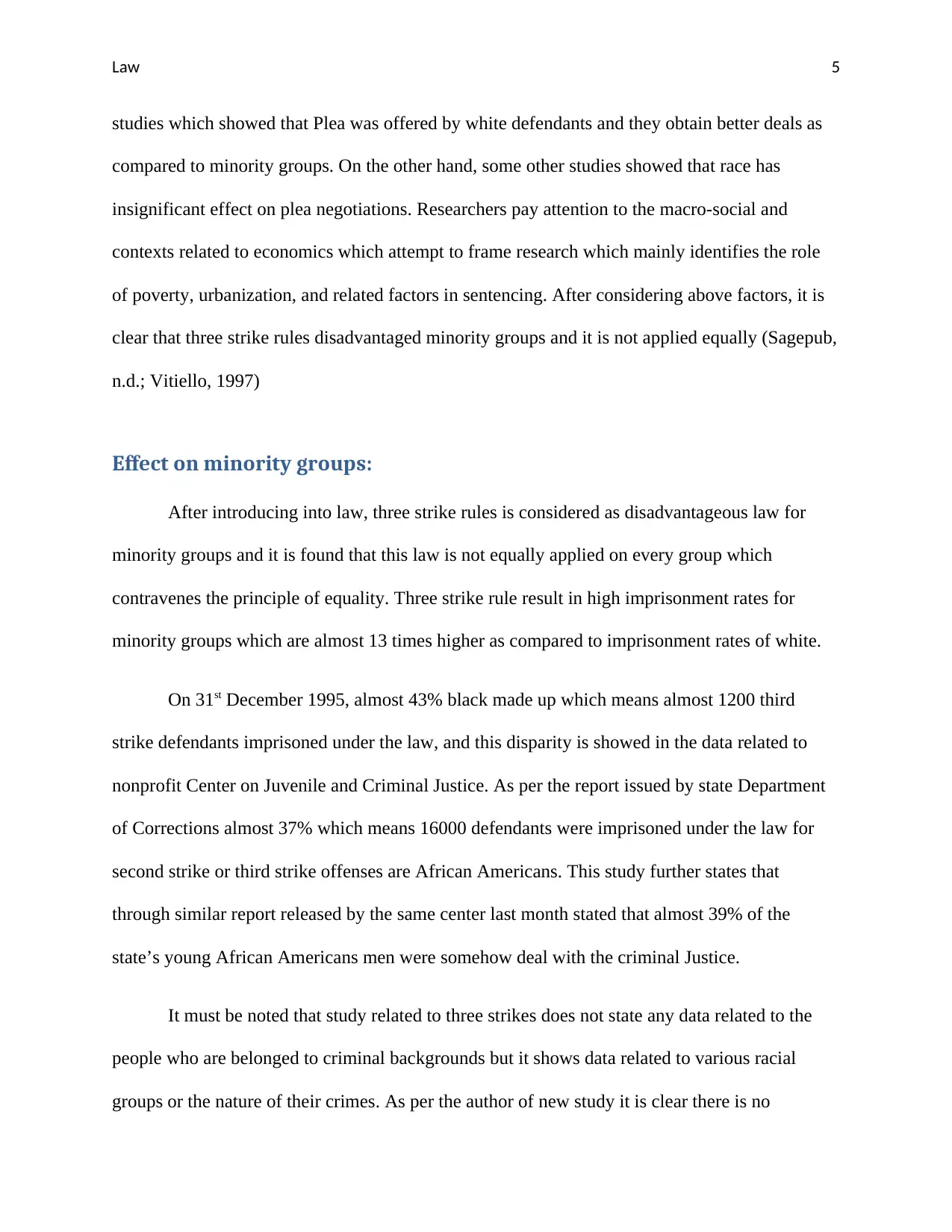
Law 5
studies which showed that Plea was offered by white defendants and they obtain better deals as
compared to minority groups. On the other hand, some other studies showed that race has
insignificant effect on plea negotiations. Researchers pay attention to the macro-social and
contexts related to economics which attempt to frame research which mainly identifies the role
of poverty, urbanization, and related factors in sentencing. After considering above factors, it is
clear that three strike rules disadvantaged minority groups and it is not applied equally (Sagepub,
n.d.; Vitiello, 1997)
Effect on minority groups:
After introducing into law, three strike rules is considered as disadvantageous law for
minority groups and it is found that this law is not equally applied on every group which
contravenes the principle of equality. Three strike rule result in high imprisonment rates for
minority groups which are almost 13 times higher as compared to imprisonment rates of white.
On 31st December 1995, almost 43% black made up which means almost 1200 third
strike defendants imprisoned under the law, and this disparity is showed in the data related to
nonprofit Center on Juvenile and Criminal Justice. As per the report issued by state Department
of Corrections almost 37% which means 16000 defendants were imprisoned under the law for
second strike or third strike offenses are African Americans. This study further states that
through similar report released by the same center last month stated that almost 39% of the
state’s young African Americans men were somehow deal with the criminal Justice.
It must be noted that study related to three strikes does not state any data related to the
people who are belonged to criminal backgrounds but it shows data related to various racial
groups or the nature of their crimes. As per the author of new study it is clear there is no
studies which showed that Plea was offered by white defendants and they obtain better deals as
compared to minority groups. On the other hand, some other studies showed that race has
insignificant effect on plea negotiations. Researchers pay attention to the macro-social and
contexts related to economics which attempt to frame research which mainly identifies the role
of poverty, urbanization, and related factors in sentencing. After considering above factors, it is
clear that three strike rules disadvantaged minority groups and it is not applied equally (Sagepub,
n.d.; Vitiello, 1997)
Effect on minority groups:
After introducing into law, three strike rules is considered as disadvantageous law for
minority groups and it is found that this law is not equally applied on every group which
contravenes the principle of equality. Three strike rule result in high imprisonment rates for
minority groups which are almost 13 times higher as compared to imprisonment rates of white.
On 31st December 1995, almost 43% black made up which means almost 1200 third
strike defendants imprisoned under the law, and this disparity is showed in the data related to
nonprofit Center on Juvenile and Criminal Justice. As per the report issued by state Department
of Corrections almost 37% which means 16000 defendants were imprisoned under the law for
second strike or third strike offenses are African Americans. This study further states that
through similar report released by the same center last month stated that almost 39% of the
state’s young African Americans men were somehow deal with the criminal Justice.
It must be noted that study related to three strikes does not state any data related to the
people who are belonged to criminal backgrounds but it shows data related to various racial
groups or the nature of their crimes. As per the author of new study it is clear there is no
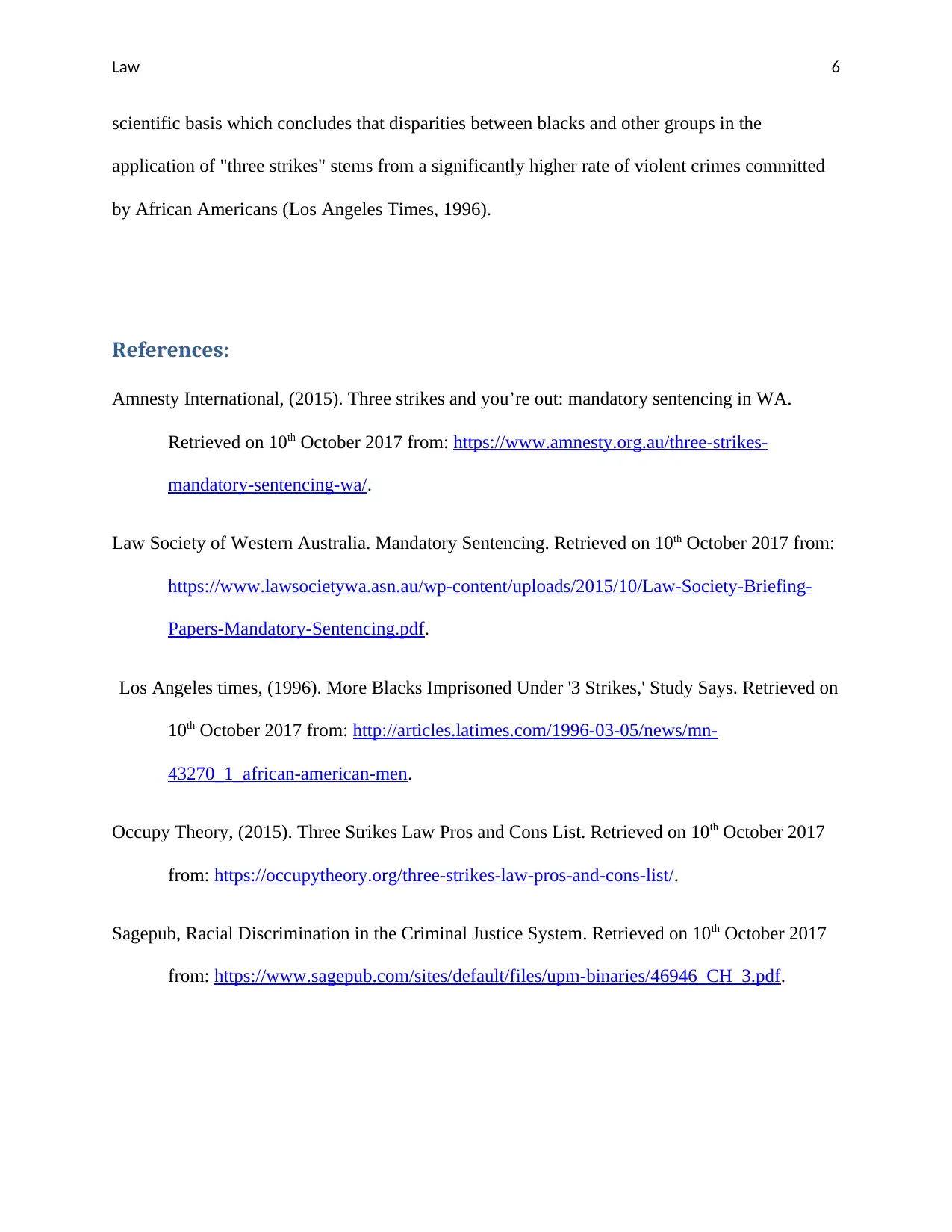
Law 6
scientific basis which concludes that disparities between blacks and other groups in the
application of "three strikes" stems from a significantly higher rate of violent crimes committed
by African Americans (Los Angeles Times, 1996).
References:
Amnesty International, (2015). Three strikes and you’re out: mandatory sentencing in WA.
Retrieved on 10th October 2017 from: https://www.amnesty.org.au/three-strikes-
mandatory-sentencing-wa/.
Law Society of Western Australia. Mandatory Sentencing. Retrieved on 10th October 2017 from:
https://www.lawsocietywa.asn.au/wp-content/uploads/2015/10/Law-Society-Briefing-
Papers-Mandatory-Sentencing.pdf.
Los Angeles times, (1996). More Blacks Imprisoned Under '3 Strikes,' Study Says. Retrieved on
10th October 2017 from: http://articles.latimes.com/1996-03-05/news/mn-
43270_1_african-american-men.
Occupy Theory, (2015). Three Strikes Law Pros and Cons List. Retrieved on 10th October 2017
from: https://occupytheory.org/three-strikes-law-pros-and-cons-list/.
Sagepub, Racial Discrimination in the Criminal Justice System. Retrieved on 10th October 2017
from: https://www.sagepub.com/sites/default/files/upm-binaries/46946_CH_3.pdf.
scientific basis which concludes that disparities between blacks and other groups in the
application of "three strikes" stems from a significantly higher rate of violent crimes committed
by African Americans (Los Angeles Times, 1996).
References:
Amnesty International, (2015). Three strikes and you’re out: mandatory sentencing in WA.
Retrieved on 10th October 2017 from: https://www.amnesty.org.au/three-strikes-
mandatory-sentencing-wa/.
Law Society of Western Australia. Mandatory Sentencing. Retrieved on 10th October 2017 from:
https://www.lawsocietywa.asn.au/wp-content/uploads/2015/10/Law-Society-Briefing-
Papers-Mandatory-Sentencing.pdf.
Los Angeles times, (1996). More Blacks Imprisoned Under '3 Strikes,' Study Says. Retrieved on
10th October 2017 from: http://articles.latimes.com/1996-03-05/news/mn-
43270_1_african-american-men.
Occupy Theory, (2015). Three Strikes Law Pros and Cons List. Retrieved on 10th October 2017
from: https://occupytheory.org/three-strikes-law-pros-and-cons-list/.
Sagepub, Racial Discrimination in the Criminal Justice System. Retrieved on 10th October 2017
from: https://www.sagepub.com/sites/default/files/upm-binaries/46946_CH_3.pdf.
⊘ This is a preview!⊘
Do you want full access?
Subscribe today to unlock all pages.

Trusted by 1+ million students worldwide
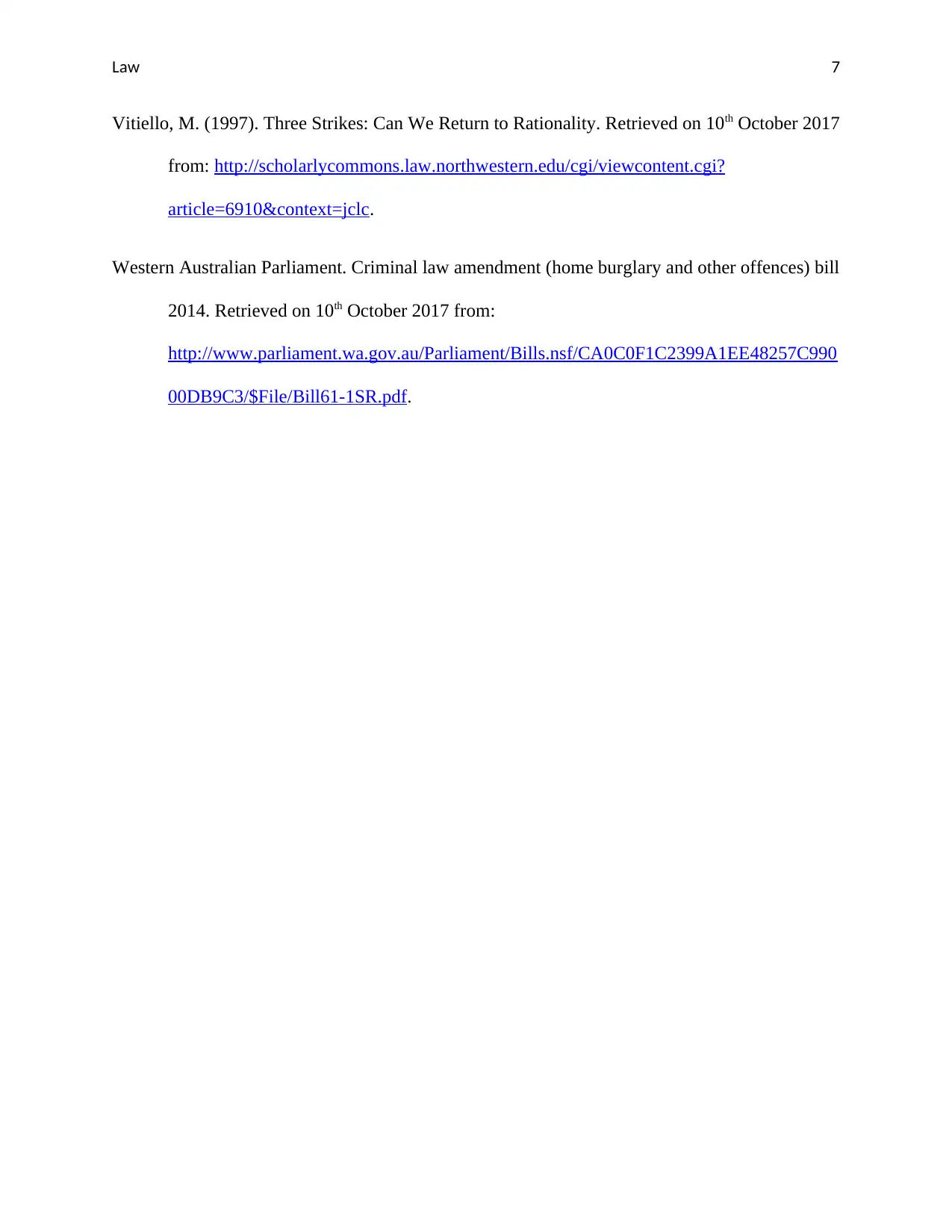
Law 7
Vitiello, M. (1997). Three Strikes: Can We Return to Rationality. Retrieved on 10th October 2017
from: http://scholarlycommons.law.northwestern.edu/cgi/viewcontent.cgi?
article=6910&context=jclc.
Western Australian Parliament. Criminal law amendment (home burglary and other offences) bill
2014. Retrieved on 10th October 2017 from:
http://www.parliament.wa.gov.au/Parliament/Bills.nsf/CA0C0F1C2399A1EE48257C990
00DB9C3/$File/Bill61-1SR.pdf.
Vitiello, M. (1997). Three Strikes: Can We Return to Rationality. Retrieved on 10th October 2017
from: http://scholarlycommons.law.northwestern.edu/cgi/viewcontent.cgi?
article=6910&context=jclc.
Western Australian Parliament. Criminal law amendment (home burglary and other offences) bill
2014. Retrieved on 10th October 2017 from:
http://www.parliament.wa.gov.au/Parliament/Bills.nsf/CA0C0F1C2399A1EE48257C990
00DB9C3/$File/Bill61-1SR.pdf.
1 out of 7
Related Documents
Your All-in-One AI-Powered Toolkit for Academic Success.
+13062052269
info@desklib.com
Available 24*7 on WhatsApp / Email
![[object Object]](/_next/static/media/star-bottom.7253800d.svg)
Unlock your academic potential
Copyright © 2020–2025 A2Z Services. All Rights Reserved. Developed and managed by ZUCOL.



